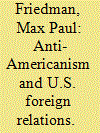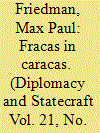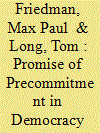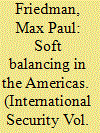| Srl | Item |
| 1 |
ID:
083967


|
|
|
| 2 |
ID:
101067


|
|
|
|
|
| Publication |
2010.
|
| Summary/Abstract |
The Eisenhower Administration claimed a diplomatic triumph-and a mandate to overthrow the elected government of Guatemala-after the Tenth Inter-American Conference held in Caracas, Venezuela, in March 1954, when 17 nations voted for an American resolution condemning international Communism. This article disputes the official story and some recent scholarly depictions of the conference. Caracas was the scene of intense Latin American opposition to the American agenda. Vote-buying was rampant as Washington made hundreds of millions of dollars worth of concessions to individual countries. Nonetheless, amendments pushed through by Latin American diplomats transformed the interventionist American resolution into a strong statement against intervention. The American "triumph" was actually a fiasco that called into sharp relief the difference between United States and Latin American understandings of the inter-American system, demonstrating Latin American diplomatic resistance to intervention and the limits of diplomacy's potential to constrain the actions of the most powerful American state.
|
|
|
|
|
|
|
|
|
|
|
|
|
|
|
|
| 3 |
ID:
175833


|
|
|
|
|
| Summary/Abstract |
Although international precommitment regimes offer a tool to escape the apparent contradiction between sovereignty and the international protection of democracy and human rights, they raise theoretical and practical questions. This article draws on multinational archival research to explore an overlooked historical episode and suggest new thinking regarding the logjams over sovereignty, incapacity of global decision making, and humanitarian imperialism. In 1945 and 1946, the American states engaged in a debate over the Larreta Doctrine, a Uruguayan proposal about the parallelism between democracy and human rights, and the regional rights and duties to safeguard these values. In the ensuing debate, the Uruguayan foreign minister elaborated a tripartite precommitment mechanism to create a web of national commitments to democratic governance and the domestic protection of human rights, to establish a regional insurance policy against failures to maintain those commitments, and to obligate the great power and neighboring states to precommit to working through the regional system instead of unilaterally. As a proposal that emerged from a weak state—and garnered support from states that faced internal and external threats to democracy and rights—the Larreta Doctrine offers insights on the central tension between state sovereignty and international commitments.
|
|
|
|
|
|
|
|
|
|
|
|
|
|
|
|
| 4 |
ID:
140919


|
|
|
|
|
| Summary/Abstract |
In the aftermath of the 2003 U.S.-led invasion of Iraq, scholars of international relations debated how to best characterize the rising tide of global opposition. The concept of “soft balancing” emerged as an influential, though contested, explanation of a new phenomenon in a unipolar world: states seeking to constrain the ability of the United States to deploy military force by using multinational organizations, international law, and coalition building. Soft balancing can also be observed in regional unipolar systems. Multinational archival research reveals how Argentina, Mexico, and other Latin American countries responded to expanding U.S. power and military assertiveness in the early twentieth century through coordinated diplomatic maneuvering that provides a strong example of soft balancing. Examination of this earlier case makes an empirical contribution to the emerging soft-balancing literature and suggests that soft balancing need not lead to hard balancing or open conflict.
|
|
|
|
|
|
|
|
|
|
|
|
|
|
|
|